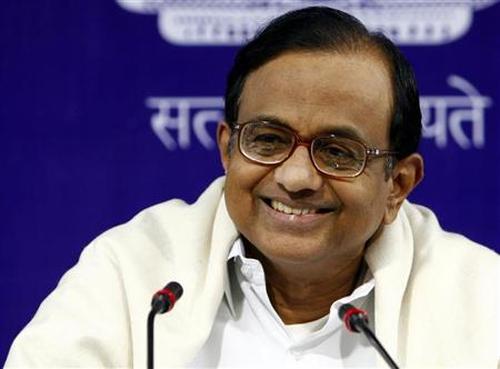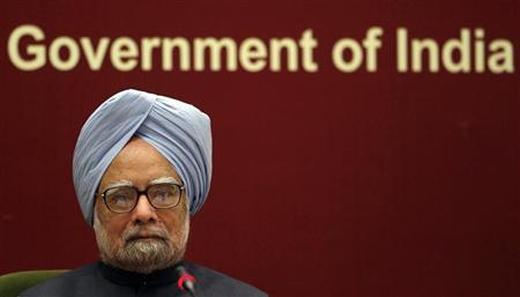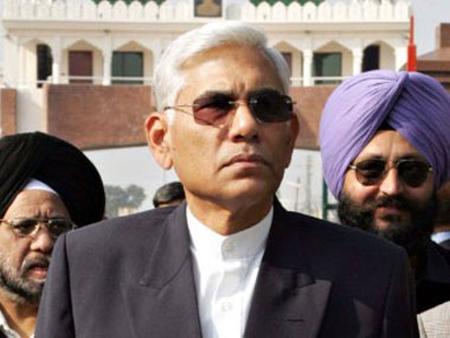Photographs: Adnan Abidi/Reuters A K Bhattacharya in New Delhi
With 2012 coming to an end, civil servants are likely to heave a sigh of relief as most of them would concur that it was one of the most depressing years in recent times.
For much of the year, Raisina Hill was witness to a perceptible decline in governance, induced in no small measure by a policy paralysis that got worse with the rise of popular discontent over a series of corruption charges against ministers in the United Progressive Alliance, or UPA, government.
Civil servants had their own explanation of why the policy paralysis gripped the government. According to some of them, it was a vicious cycle.
The corruption charges were not restricted to merely UPA's ministers or the ruling party politicians. The investigating agencies widened their net to bring to book both retired and serving bureaucrats.
The government was on the defensive and this forced many bureaucrats to adopt an even more defensive stance. As a result, few bureaucrats were willing to take decisions for fear of some controversy erupting later and implicating them.
With the political leadership reluctant to take concrete steps to tackle corruption and civil servants refusing to take the lead in taking decisions, the vicious cycle was complete.
Ta-Ta, Ratan: Tribute to an iconic Indian
...
Why bureaucrats can take better decisions in 2013
Image: Finance Minister P. Chidambaram.Photographs: B Mathur/Reuters
The situation improved somewhat in the last few months of 2012, with the government regaining its momentum for policy action and bureaucrats too following suit by backing up the political initiatives with administrative alacrity that was missing earlier in the year.
What 2012 established beyond doubt was that if the political leadership failed to take the lead in decision-making, civil servants were in no position to make amends.
The "steel frame" that is supposed to provide continuity in governance and administrative action in the event of a political vacuum or paralysis simply failed to live up to those expectations.
Will 2013 be better for Raisina Hill? The early signals are clearly positive. For instance, the Union finance ministry is in better shape - much better than what it looked like at the start of 2012, when the team in North Block hardly inspired confidence.
Kaushik Basu was busy completing his extended tenure as the chief economic advisor and the other secretaries in charge of different departments in the finance ministry were completely overshadowed by the finance minister at that time, Pranab Mukherjee, and his all-powerful special advisor.
An economist with an impeccable track record decided not to accept an offer to join Mukherjee's team as he feared that he would not be able to function with the autonomy that is needed for any professional to be effective.
A senior civil servant, an ideal choice to be finance secretary, decided to opt out of the race for similar reasons. In other words, the finance ministry was hardly the place that could become the prime force for economic reform and governance improvement.
Ta-Ta, Ratan: Tribute to an iconic Indian
...
Why bureaucrats can take better decisions in 2013
Image: Prime Minister Manmohan Singh.Photographs: B Mathur/Reuters
In sharp contrast, P Chidambaram, who took charge of the finance ministry last August, has put in place a more effective team of bureaucrats, aided by two fine economists who would work as part of the finance minister's think tank.
Simultaneously, the government has begun moving decisively on many of its long-overdue reform areas - the launch of the Unique Identity-based scheme for cash transfer will take place in January.
Also, there appears to be a renewed commitment towards fiscal consolidation, tax reforms such as the introduction of the goods and services tax regime, phase-out of subsidies and a phased increase in energy prices.
While the prospects for policy action look good, civil servants, however, would look for answers to three specific questions.
One, will 2013 put an end to the extension raj? Two, will ministers continue to be given complete freedom in choosing secretaries for their ministries and departments?
And finally, will the Prime Minister's Office (PMO) gain in strength with greater say in the way policies are to be implemented by different Union ministries?
There is no doubt that the government under Manmohan Singh has been generous with giving extension to senior bureaucrats in key positions.
Ta-Ta, Ratan: Tribute to an iconic Indian
...
Why bureaucrats can take better decisions in 2013
Image: Comptroller and Auditor General Vinod Rai.Photographs: Reuters
While the policy of granting extension may help the government retain talented and competent officers in service, it also dampens the motivation level and morale of a large number of officials who may be waiting in the queue to take a shot at some of the key jobs.
Several senior officials were, thus, upset about the extension given to K M Chandrasekhar as Cabinet secretary, who had a four-year-long stint starting from June 2007.
In June 2013, the government will be required to decide whether to grant the current incumbent, Ajit Seth, an extension or look for a new Cabinet secretary.
Around the same time, the government would be required to take another equally important decision: that of appointing a successor to Vinod Rai, who will complete his tenure as Comptroller and Auditor General by end-May.
Will ministers continue to enjoy the freedom to have their say in getting secretaries and key appointees of their choice? Yes, that is unlikely to change.
It's true that the PMO has been beefed up and, under Pulok Chaterji as principal secretary, it will continue to co-ordinate the government's policy initiatives.
But ministers are in no mood to give up their say in deciding on key appointments in their ministries, and the PMO's clout in such matters has not yet become that strong.
Nevertheless, the mood in the bureaucracy is not one of despondency. It seems the worst as far as their motivation level is concerned is over.






article